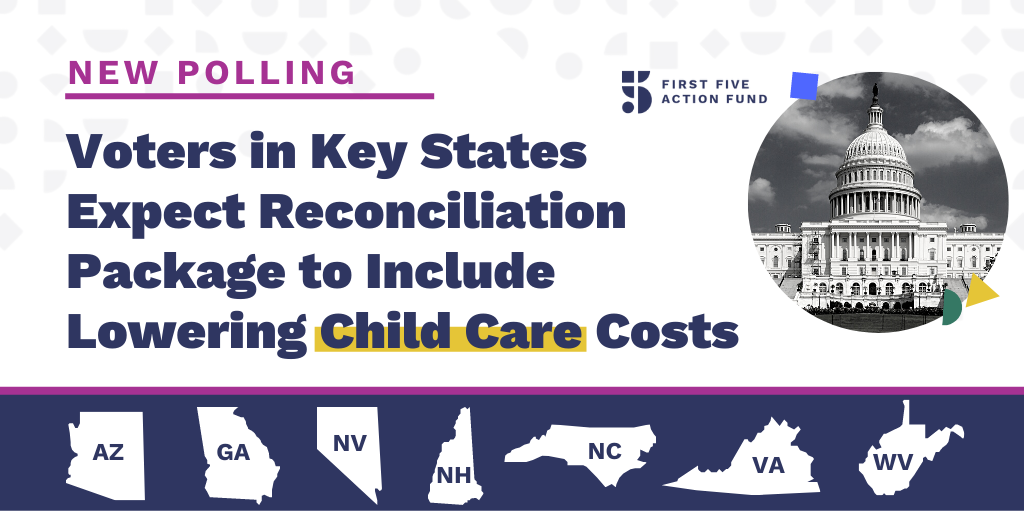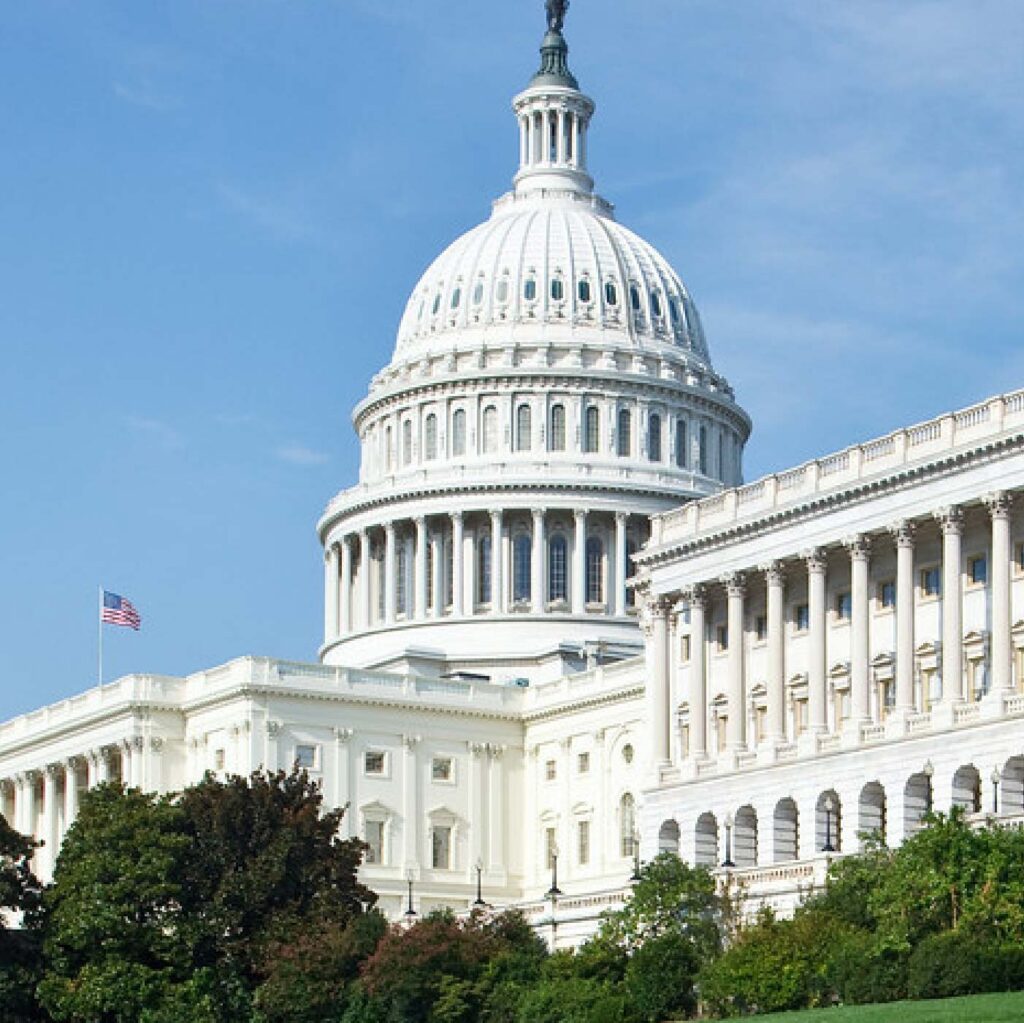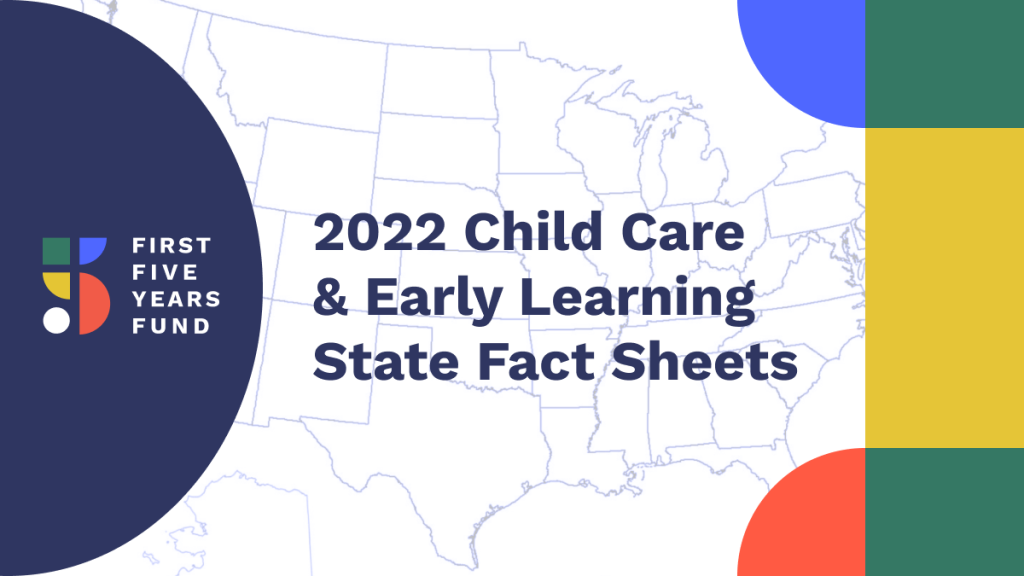Voter Support for Child Care Rivals Drug Pricing, Climate & Energy in Reconciliation

WASHINGTON — As Congressional Democrats negotiate the contents of a budget reconciliation package, new bipartisan polling shows that likely voters in seven Senate battleground states have a clear, two-pronged message for Congress: the legislation should lower the costs for families; and support for lowering the cost of child care rivals prescription drug prices and climate change for inclusion in this package. The bipartisan polling, conducted by Hart Research and New Bridge Strategy on behalf of First Five Action Fund (FFAF), surveyed likely voters in Arizona, Georgia, New Hampshire, Nevada, North Carolina, Virginia, and West Virginia.
“At a time when Americans are being stretched thin by rising costs across the board, voters are unequivocal that lowering child care costs is essential to the legislative package under consideration,” said First Five Action Fund President Sarah Rittling. “In fact, support is stronger for including child care than other priorities that have received greater attention from lawmakers in recent weeks. As Democratic Congressional leaders look ahead to the midterm elections, important voter groups in key states are watching to see how Congress proceeds — and a strong majority indicate they’ll be unhappy with their lawmakers if they support a package that forsakes child care. This is a make-or-break moment for working families, and it hinges on whether Congress secures the sustained funding required to support a strong, stable early learning system that families and providers can depend on. Lawmakers can’t abandon the tremendous work they’ve done to reach this moment and must be united on including child care in reconciliation.”
POLL RESULTS AND MORE INFORMATION IS AVAILABLE HERE
Key Findings:
Lowering the cost of child care rivals prescription drug prices and exceeds climate change in terms of importance for inclusion in this package.
- Looking across all states, 81% say it is important for the legislation to lower the cost of child care, compared with 92% who say it is important to reduce the cost of prescription drugs and 66% who say it is important to address climate change.
- Total Percentages by State
- Arizona (Child Care – 82%; Climate – 69%; Prescription Drugs – 94%)
- Georgia (Child Care – 87%; Climate – 68%; Prescription Drugs – 94%)
- Nevada (Child Care – 76%; Climate – 61%; Prescription Drugs – 88%)
- New Hampshire (Child Care – 78%; Climate – 68%; Prescription Drugs – 88%)
- North Carolina (Child Care – 84%; Climate – 69%; Prescription Drugs – 94%)
- Virginia (Child Care – 82%; Climate – 73%; Prescription Drugs – 94%)
- West Virginia (Child Care – 75%; Climate – 46%; Prescription Drugs – 87%)
But more important than the idea that child care should be included, voters are paying attention and say they will be upset or disappointed with their member of Congress if child care is not included in reconciliation.
- 66% say they would be disappointed (51%) or upset (15%) with their member of Congress if their member votes to approve legislation that excludes child care.
- Eight in ten Democrats (82%) feel this way, as do more than half of Republicans (53%).
- Notably, 66% of swing voters say they, too, would be disappointed or upset.
Total Percentages by State: AZ – 67%; GA – 70%; NC – 70% NH – 60%; NV – 62%; VA – 69%; WV – 59%
Even among people who think government spending is too high, there is broad agreement that child care should be included in the reconciliation package, and voters across the board say lowering child care costs is a good use of taxpayer money.
- More than three in four voters (77%) say that child care and early learning programs are a good investment of taxpayers’ money. Even 65% of those who say federal spending is too high believe child care to be a good investment.
- Seventy-seven percent (77%) also agree that their community would benefit from child care being more available and affordable. That includes 85% of urban residents, 76% of suburban residents, and 75% of those in small town and rural areas.
- Seventy-three percent (73%) agree that more available and affordable child care will help the economy recover from the pandemic by helping people get back to work. Parents (79%) and those without children (72%) each believe this to be the case.
Both the need for and the benefits of child care are apparent to voters.
- Forty-three percent (43%) of all voters say they, a coworker, or a friend or family member has had trouble finding child care in the past several years. That includes 34% of parents who say this applies to themselves.
- Sixty-one percent (61%) say the only way to meet demand for child care and ensure its affordability is for the government to take action; 36% believe cost and availability will improve on their own.
Last week, the Senate Committee on Health, Education, Labor & Pensions (HELP), led by Sen. Patty Murray, held a hearing on the state of America’s child care crisis, with testimony from policy experts, practitioners, and state leaders on the opportunity — and significant need — for Congress to support a strong, stable early learning system. The hearing showcased the universal understanding among Democrats and Republicans on the Committee about Congress being essential to solving the child care crisis. All four witnesses underscored the realities families face, the role stable, quality child care plays in our economy, and cited the need for significant federal investment in child care through reconciliation.
The First Five Action Fund is the leading bipartisan federal advocacy organization working to ensure all children from birth through age five have equal access to affordable, comprehensive, high-quality care and education to support their healthy development and help them achieve their full potential in school and life. FFYF seeks to expand federal support for all early learning and care opportunities that are high-quality and focused first on serving those children most-at-risk.http://www.ffyf.org
###
Subscribe to FFYF First Look
Every morning, FFYF reports on the latest child care & early learning news from across the country. Subscribe and take 5 minutes to know what's happening in early childhood education.



